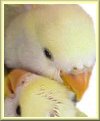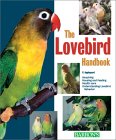Lovebirds Can Be Lovable
 Time and time again I hear from disgruntled lovebird owners. They bought a hand-fed baby lovebird from a pet store and the bird bites, refuses to come out of the cage, and acts as if it is being murdered when you finally catch it. These experiences have given lovebirds an undeserved reputation as wild, unfriendly parrots. In truth, when these petite African parrots are hand-fed and given an adequate amount of attention during the first few months of life, they make wonderful, endearing pets.
Time and time again I hear from disgruntled lovebird owners. They bought a hand-fed baby lovebird from a pet store and the bird bites, refuses to come out of the cage, and acts as if it is being murdered when you finally catch it. These experiences have given lovebirds an undeserved reputation as wild, unfriendly parrots. In truth, when these petite African parrots are hand-fed and given an adequate amount of attention during the first few months of life, they make wonderful, endearing pets.
The first mistake people make is that they often purchase a lovebird without first doing their research. Even a hand-fed bird will “go wild” if left in a cage in a pet store for too long. With lovebirds, they can go wild in a matter of days if no one interacts with them. Unfortunately, most pet stores focus their attention on the larger parrots and leave the lovebirds to their own devices in their tiny, often toyless cages. Lovebirds have not been domesticated to the same degree as parakeets and cockatiels. They need daily human interaction during the first six months of life in order to stay hand tamed. Take care when choosing your pet lovebird; they live a long life and can be with you for as many as 25 years.
An important point to make is that hand-fed does not equal hand tamed. Filling a baby’s crop with formula and then dropping him back into the brooder is not going to give you an incredibly tame pet. While some lovebirds might have a particularly calm and trusting temperament so that they remain tame even with this lack of interaction, most will quickly tire of human hands as soon as they are no longer dependent on them for formula. Babies need to be played with, talked to, stroked, and reassured. These babies will make the best pets. Please note that this does not mean that you should take on the task of handfeeding if you are inexperienced. You are more likely to seriously harm or kill the bird than get a tamer pet.
I have written The Lovebird Handbook, published by Barron’s Educational Series.. Make sure you pick up the latest version of the handbook–there are many outdated lovebird books on the shelves with misinformation!









